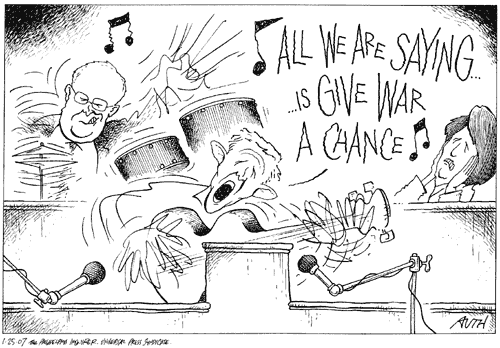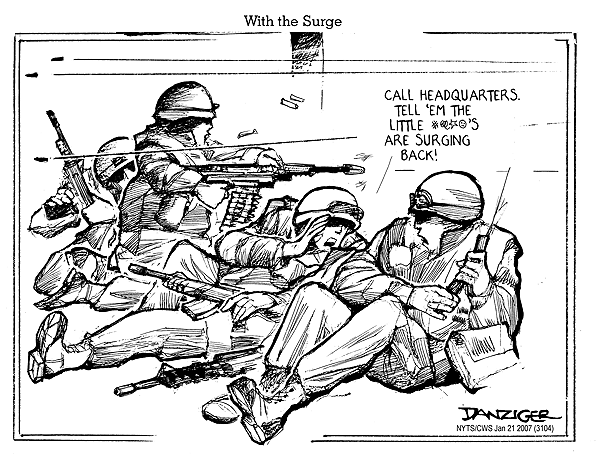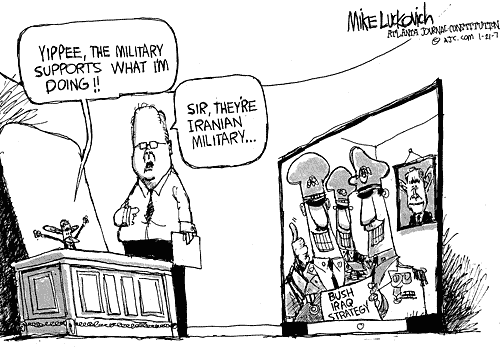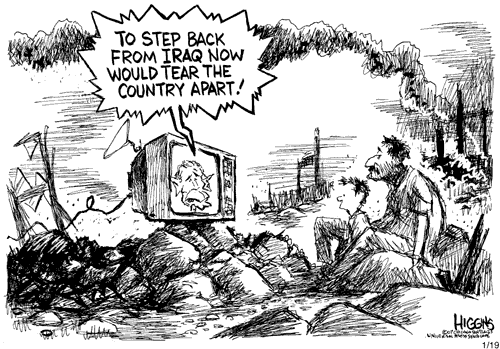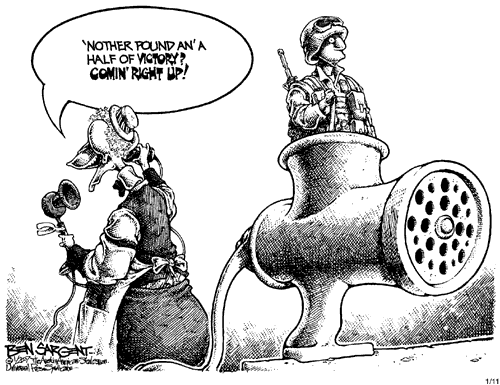This article can be found on the web at
http://www.thenation.com/doc/20070122/moyers
For America's Sake
by BILL MOYERS
[from the January 22, 2007 issue]
The following is an adaptation of remarks made by Bill Moyers to a December 12 gathering in New York sponsored by The Nation, Demos, the Brennan Center for Justice and the New Democracy Project. --The Editors
You could not have chosen a better time to gather. Voters have provided a respite from a right-wing radicalism predicated on the philosophy that extremism in the pursuit of virtue is no vice. It seems only yesterday that the Trojan horse of conservatism was hauled into Washington to disgorge Newt Gingrich, Tom DeLay, Ralph Reed, Grover Norquist and their hearty band of ravenous predators masquerading as a political party of small government, fiscal restraint and moral piety and promising "to restore accountability to Congress...[and] make us all proud again of the way free people govern themselves."
Well, the long night of the junta is over, and Democrats are ebullient as they prepare to take charge of the multitrillion-dollar influence racket that we used to call the US Congress. Let them rejoice while they can, as long as they remember that while they ran some good campaigns, they have arrived at this moment mainly because George W. Bush lost a war most people have come to believe should never have been fought in the first place. Let them remember, too, in this interim of sweet anticipation, that although they are reveling in the ruins of a Republican reign brought down by stupendous scandals, their own closet is stocked with skeletons from an era when they were routed from office following Abscam bribes and savings and loan swindles that plucked the pockets and purses of hard-working, tax-paying Americans.
As they rejoice, Democrats would be wise to be mindful of Shakespeare's counsel, "'Tis more by fortune...than by merit." For they were delivered from the wilderness not by their own goodness and purity but by the grace of K Street corruption, DeLay Inc.'s duplicity, the pitiless exploitation of Terri Schiavo, the disgrace of Mark Foley and a shameful partisan cover-up, the shamelessness of Jack Abramoff and a partisan conspiracy, and neocon arrogance and amorality (yes, amoral: Apparently there is no end to the number of bodies Bill Kristol and Richard Perle are prepared to watch pile up on behalf of illusions that can't stand the test of reality even one Beltway block from the think tanks where they are hatched). The Democrats couldn't have been more favored by the gods if they had actually believed in one!
But whatever one might say about the election, the real story is one that our political and media elites are loath to acknowledge or address. I am not speaking of the lengthy list of priorities that progressives and liberals of every stripe are eager to put on the table now that Democrats hold the cards in Congress. Just the other day a message popped up on my computer from a progressive advocate whose work I greatly admire. Committed to movement-building from the ground up, he has results to show for his labors. His request was simple: "With changes in Congress and at our state capitol, we want your input on what top issues our lawmakers should tackle. Click here to submit your top priority."
I clicked. Sure enough, up came a list of thirty-four issues--an impressive list that began with "African-American" and ran alphabetically through "energy" and "higher education" to "guns," "transportation," "women's issues" and "workers' rights." It wasn't a list to be dismissed, by any means, for it came from an unrequited thirst for action after a long season of malignant opposition to every item on the agenda. I understand the mindset. Here's a fellow who values allies and appreciates what it takes to build coalitions; who knows that although our interests as citizens vary, each one is an artery to the heart that pumps life through the body politic, and each is important to the health of democracy. This is an activist who knows political success is the sum of many parts.
But America needs something more right now than a "must-do" list from liberals and progressives. America needs a different story. The very morning I read the message from the progressive activist, the New York Times reported on Carol Ann Reyes. Carol Ann Reyes is 63. She lives in Los Angeles, suffers from dementia and is homeless. Somehow she made her way to a hospital with serious, untreated needs. No details were provided as to what happened to her there, except that the hospital--which is part of Kaiser Permanente, the largest HMO in the country--called a cab and sent her back to skid row. True, they phoned ahead to workers at a rescue shelter to let them know she was coming. But some hours later a surveillance camera picked her up "wandering around the streets in a hospital gown and slippers." Dumped in America.
Here is the real political story, the one most politicians won't even acknowledge: the reality of the anonymous, disquieting daily struggle of ordinary people, including the most marginalized and vulnerable Americans but also young workers and elders and parents, families and communities, searching for dignity and fairness against long odds in a cruel market world.
Everywhere you turn you'll find people who believe they have been written out of the story. Everywhere you turn there's a sense of insecurity grounded in a gnawing fear that freedom in America has come to mean the freedom of the rich to get richer even as millions of Americans are dumped from the Dream. So let me say what I think up front: The leaders and thinkers and activists who honestly tell that story and speak passionately of the moral and religious values it puts in play will be the first political generation since the New Deal to win power back for the people.
There's no mistaking that America is ready for change. One of our leading analysts of public opinion, Daniel Yankelovich, reports that a majority want social cohesion and common ground based on pragmatism and compromise, patriotism and diversity. But because of the great disparities in wealth, the "shining city on the hill" has become a gated community whose privileged occupants, surrounded by a moat of money and protected by a political system seduced with cash into subservience, are removed from the common life of the country. The wreckage of this abdication by elites is all around us.
Corporations are shredding the social compact, pensions are disappearing, median incomes are flattening and healthcare costs are soaring. In many ways, the average household is generally worse off today than it was thirty years ago, and the public sector that was a support system and safety net for millions of Americans across three generations is in tatters. For a time, stagnating wages were somewhat offset by more work and more personal debt. Both political parties craftily refashioned those major renovations of the average household as the new standard, shielding employers from responsibility for anything Wall Street didn't care about. Now, however, the more acute major risks workers have been forced to bear as employers reduce their health and retirement costs--on orders from Wall Street--have made it clear that our fortunes are being reversed. Polls show that a majority of US workers now believe their children will be worse off than they are. In one recent survey, only 14 percent of workers said that they have obtained the American Dream.
It is hard to believe that less than four decades ago a key architect of the antipoverty program, Robert Lampman, could argue that the "recent history of Western nations reveals an increasingly widespread adoption of the idea that substantial equality of social and economic conditions among individuals is a good thing." Economists call that postwar era "the Great Compression." Poverty and inequality had declined dramatically for the first time in our history. Here, as Paul Krugman recently recounted, is how Time's report on the national outlook in 1953 summed it up: "Even in the smallest towns and most isolated areas, the U.S. is wearing a very prosperous, middle-class suit of clothes, and an attitude of relaxation and confidence. People are not growing wealthy, but more of them than ever before are getting along." African-Americans were still written out of the story, but that was changing, too, as heroic resistance emerged across the South to awaken our national conscience. Within a decade, thanks to the civil rights movement and President Johnson, the racial cast of federal policy--including some New Deal programs--was aggressively repudiated, and shared prosperity began to breach the color line.
To this day I remember John F. Kennedy's landmark speech at the Yale commencement in 1962. Echoing Daniel Bell's cold war classic The End of Ideology, JFK proclaimed the triumph of "practical management of a modern economy" over the "grand warfare of rival ideologies." The problem with this--and still a major problem today--is that the purported ideological cease-fire ended only a few years later. But the Democrats never re-armed, and they kept pinning all their hopes on economic growth, which by its very nature is valueless and cannot alone provide answers to social and moral questions that arise in the face of resurgent crisis. While "practical management of a modern economy" had a kind of surrogate legitimacy as long as it worked, when it no longer worked, the nation faced a paralyzing moral void in deciding how the burdens should be borne. Well-organized conservative forces, firing on all ideological pistons, rushed to fill this void with a story corporate America wanted us to hear. Inspired by bumper-sticker abstractions of Milton Friedman's ideas, propelled by cascades of cash from corporate chieftans like Coors and Koch and "Neutron" Jack Welch, fortified by the pious prescriptions of fundamentalist political preachers like Jerry Falwell and Pat Robertson, the conservative armies marched on Washington. And they succeeded brilliantly.
When Ronald Reagan addressed the Republican National Convention in 1980, he a told a simple story, one that had great impact. "The major issue of this campaign is the direct political, personal and moral responsibility of Democratic Party leadership--in the White House and in Congress--for this unprecedented calamity which has befallen us." He declared, "I will not stand by and watch this great country destroy itself." It was a speech of bold contrasts, of good private interest versus bad government, of course. More important, it personified these two forces in a larger narrative of freedom, reaching back across the Great Depression, the Civil War and the American Revolution, all the way back to the Mayflower Compact. It so dazzled and demoralized Democrats they could not muster a response to the moral abandonment and social costs that came with the Reagan revolution.
We too have a story of freedom to tell, and it too reaches back across the Great Depression, the Civil War and the American Revolution, all the way back to the Mayflower Compact. It's a story with clear and certain foundations, like Reagan's, but also a tumultuous and sometimes violent history of betrayal that he and other conservatives consistently and conveniently ignore.
Reagan's story of freedom superficially alludes to the Founding Fathers, but its substance comes from the Gilded Age, devised by apologists for the robber barons. It is posed abstractly as the freedom of the individual from government control--a Jeffersonian ideal at the root of our Bill of Rights, to be sure. But what it meant in politics a century later, and still means today, is the freedom to accumulate wealth without social or democratic responsibilities and the license to buy the political system right out from under everyone else, so that democracy no longer has the ability to hold capitalism accountable for the good of the whole.
And that is not how freedom was understood when our country was founded. At the heart of our experience as a nation is the proposition that each one of us has a right to "life, liberty, and the pursuit of happiness." As flawed in its reach as it was brilliant in its inspiration for times to come, that proposition carries an inherent imperative: "inasmuch as the members of a liberal society have a right to basic requirements of human development such as education and a minimum standard of security, they have obligations to each other, mutually and through their government, to ensure that conditions exist enabling every person to have the opportunity for success in life."
The quote comes directly from Paul Starr, one of our most formidable public thinkers, whose forthcoming book, Freedom's Power: The True Force of Liberalism, is a profound and stirring call for liberals to reclaim the idea of America's greatness as their own. Starr's book is one of three new books that in a just world would be on every desk in the House and Senate when Congress convenes again.
John Schwarz, in Freedom Reclaimed: Rediscovering the American Vision, rescues the idea of freedom from market cultists whose "particular idea of freedom...has taken us down a terribly mistaken road" toward a political order where "government ends up servicing the powerful and taking from everyone else." The free-market view "cannot provide us with a philosophy we find compelling or meaningful," Schwarz writes. Nor does it assure the availability of economic opportunity "that is truly adequate to each individual and the status of full legal as well as political equality." Yet since the late nineteenth century it has been used to shield private power from democratic accountability, in no small part because conservative rhetoric has succeeded in denigrating government even as conservative politicians plunder it.
But government, Schwarz reminds us, "is not simply the way we express ourselves collectively but also often the only way we preserve our freedom from private power and its incursions." That is one reason the notion that every person has a right to meaningful opportunity "has assumed the position of a moral bottom line in the nation's popular culture ever since the beginning." Freedom, he says, is "considerably more than a private value." It is essentially a social idea, which explains why the worship of the free market "fails as a compelling idea in terms of the moral reasoning of freedom itself." Let's get back to basics, is Schwarz's message. Let's recapture our story.
Norton Garfinkle picks up on both Schwarz and Starr in The American Dream vs. the Gospel of Wealth, as he describes how America became the first nation on earth to offer an economic vision of opportunity for even the humblest beginner to advance, and then moved, in fits and starts--but always irrepressibly--to the invocation of positive government as the means to further that vision through politics. No one understood this more clearly, Garfinkle writes, than Abraham Lincoln, who called on the federal government to save the Union. He turned to large government expenditures for internal improvements--canals, bridges and railroads. He supported a strong national bank to stabilize the currency. He provided the first major federal funding for education, with the creation of land grant colleges. And he kept close to his heart an abiding concern for the fate of ordinary people, especially the ordinary worker but also the widow and orphan. Our greatest President kept his eye on the sparrow. He believed government should be not just "of the people" and "by the people" but "for the people." Including, we can imagine, Carol Ann Reyes.
The great leaders of our tradition--Jefferson, Lincoln and the two Roosevelts--understood the power of our story. In my time it was FDR, who exposed the false freedom of the aristocratic narrative. He made the simple but obvious point that where once political royalists stalked the land, now economic royalists owned everything standing. Mindful of Plutarch's warning that "an imbalance between rich and poor is the oldest and most fatal ailment of all republics," Roosevelt famously told America, in 1936, that "the average man once more confronts the problem that faced the Minute Man." He gathered together the remnants of the great reform movements of the Progressive Age--including those of his late-blooming cousin, Teddy--into a singular political cause that would be ratified again and again by people who categorically rejected the laissez-faire anarchy that had produced destructive, unfettered and ungovernable power. Now came collective bargaining and workplace rules, cash assistance for poor children, Social Security, the GI Bill, home mortgage subsidies, progressive taxation--democratic instruments that checked economic tyranny and helped secure America's great middle class. And these were only the beginning. The Marshall Plan, the civil rights revolution, reaching the moon, a huge leap in life expectancy--every one of these great outward achievements of the last century grew from shared goals and collaboration in the public interest.
So it is that contrary to what we have heard rhetorically for a generation now, the individualist, greed-driven, free-market ideology is at odds with our history and with what most Americans really care about. More and more people agree that growing inequality is bad for the country, that corporations have too much power, that money in politics is corrupting democracy and that working families and poor communities need and deserve help when the market system fails to generate shared prosperity. Indeed, the American public is committed to a set of values that almost perfectly contradicts the conservative agenda that has dominated politics for a generation now.
The question, then, is not about changing people; it's about reaching people. I'm not speaking simply of better information, a sharper and clearer factual presentation to disperse the thick fogs generated by today's spin machines. Of course, we always need stronger empirical arguments to back up our case. It would certainly help if at least as many people who believe, say, in a "literal devil" or that God sent George W. Bush to the White House also knew that the top 1 percent of households now have more wealth than the bottom 90 percent combined. Yes, people need more information than they get from the media conglomerates with their obsession for nonsense, violence and pap. And we need, as we keep hearing, "new ideas." But we are at an extraordinary moment. The conservative movement stands intellectually and morally bankrupt while Democrats talk about a "new direction" without convincing us they know the difference between a weather vane and a compass. The right story will set our course for a generation to come.
Some stories doom us. In Collapse: How Societies Choose to Fail or Succeed, Jared Diamond tells of the Viking colony that disappeared in the fifteenth century. The settlers had scratched a living on the sparse coast of Greenland for years, until they encountered a series of harsh winters. Their livestock, the staple of their diet, began to die off. Although the nearby waters teemed with haddock and cod, the colony's mythology prohibited the eating of fish. When their supply of hay ran out during a last terrible winter, the colony was finished. They had been doomed by their story.
Here in the first decade of the twenty-first century the story that becomes America's dominant narrative will shape our collective imagination and hence our politics. In the searching of our souls demanded by this challenge, those of us in this room and kindred spirits across the nation must confront the most fundamental progressive failure of the current era: the failure to embrace a moral vision of America based on the transcendent faith that human beings are more than the sum of their material appetites, our country is more than an economic machine, and freedom is not license but responsibility--the gift we have received and the legacy we must bequeath.
In our brief sojourn here we are on a great journey. For those who came before us and for those who follow, our moral, political and religious duty is to make sure that this nation, which was conceived in liberty and dedicated to the proposition that we are all created equal, is in good hands on our watch.
One story would return America to the days of radical laissez-faire, when there was no social contract and the strong took what they could and the weak were left to forage. The other story joins the memory of struggles that have been waged with the possibility of victories yet to be won, including healthcare for every American and a living wage for every worker. Like the mustard seed to which Jesus compared the Kingdom of God, nurtured from small beginnings in a soil thirsty for new roots, our story has been a long time unfolding. It reminds us that the freedoms and rights we treasure were not sent from heaven and did not grow on trees. They were, as John Powers has written, "born of centuries of struggle by untold millions who fought and bled and died to assure that the government can't just walk into our bedrooms and read our mail, to protect ordinary people from being overrun by massive corporations, to win a safety net against the often-cruel workings of the market, to guarantee that businessmen couldn't compel workers to work more than forty hours a week without extra compensation, to make us free to criticize our government without having our patriotism impugned, and to make sure that our leaders are answerable to the people when they choose to send our soldiers into war." The eight-hour day, the minimum wage, the conservation of natural resources, free trade unions, old-age pensions, clean air and water, safe food--all these began with citizens and won the endorsement of the political class only after long struggles and bitter attacks. Democracy works when people claim it as their own.
It is only rarely remembered that the definition of democracy immortalized by Lincoln in the Gettysburg Address had been inspired by Theodore Parker, the abolitionist prophet. Driven from his pulpit, Parker said, "I will go about and preach and lecture in the city and glen, by the roadside and field-side, and wherever men and women may be found." He became the Hound of Freedom and helped to change America through the power of the word. We have a story of equal power. It is that the promise of America leaves no one out. Go now, and tell it on the mountains. From the rooftops, tell it. From your laptops, tell it. From the street corners and from Starbucks, from delis and from diners, tell it. From the workplace and the bookstore, tell it. On campus and at the mall, tell it. Tell it at the synagogue, sanctuary and mosque. Tell it where you can, when you can and while you can--to every candidate for office, to every talk-show host and pundit, to corporate executives and schoolchildren. Tell it--for America's sake.

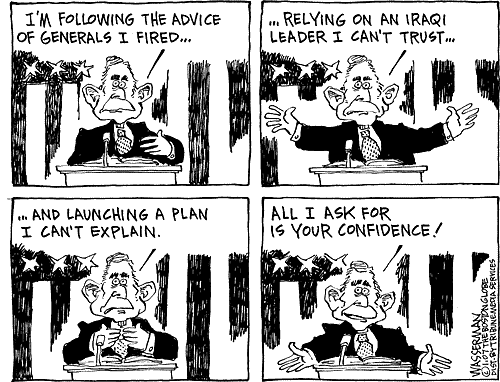
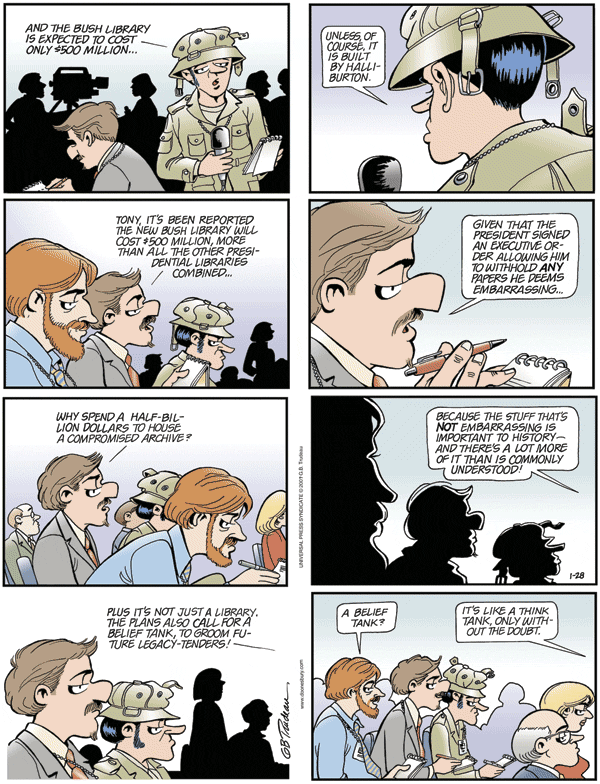

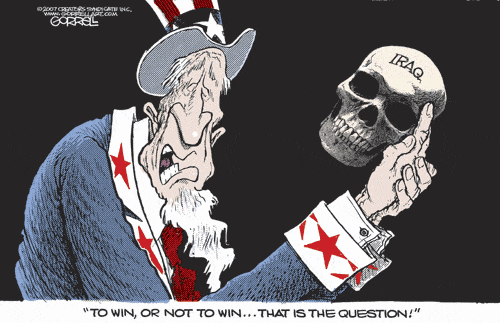




 Dramatic footage of mostly Shi'a Iraqi soldiers delivering a "brutal beating" to several local Sunnis has been obtained by a British public-service television station.
Dramatic footage of mostly Shi'a Iraqi soldiers delivering a "brutal beating" to several local Sunnis has been obtained by a British public-service television station.
